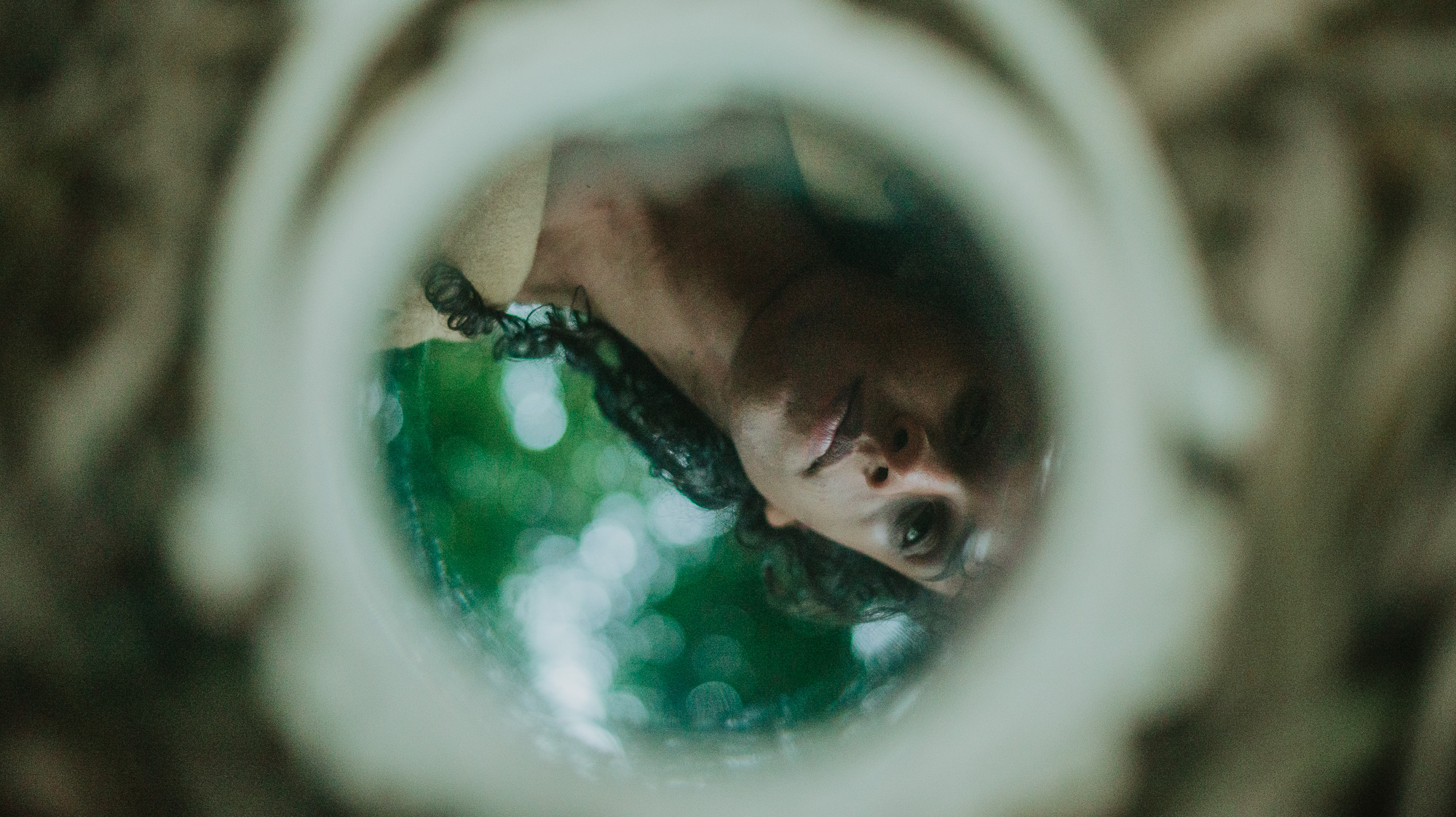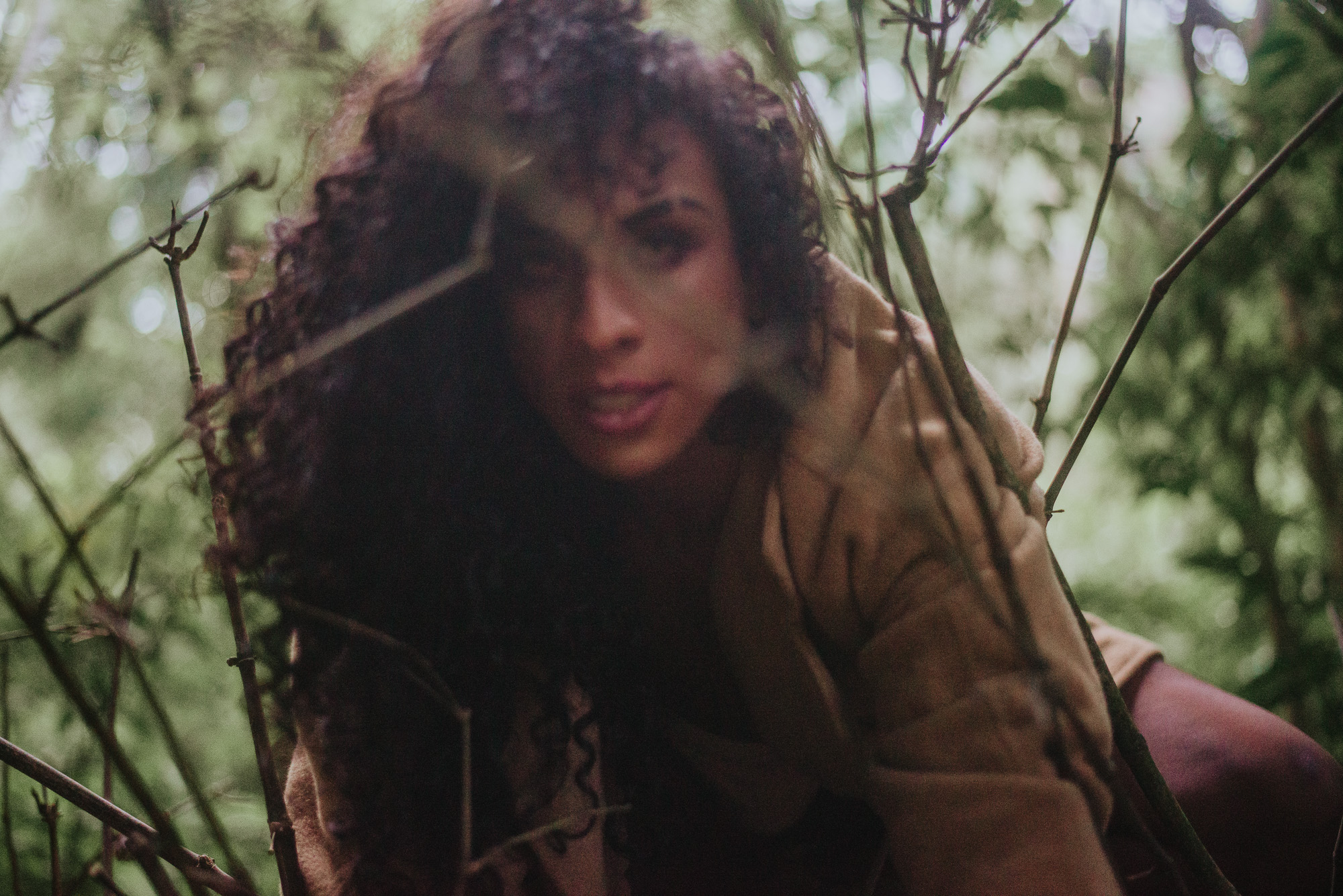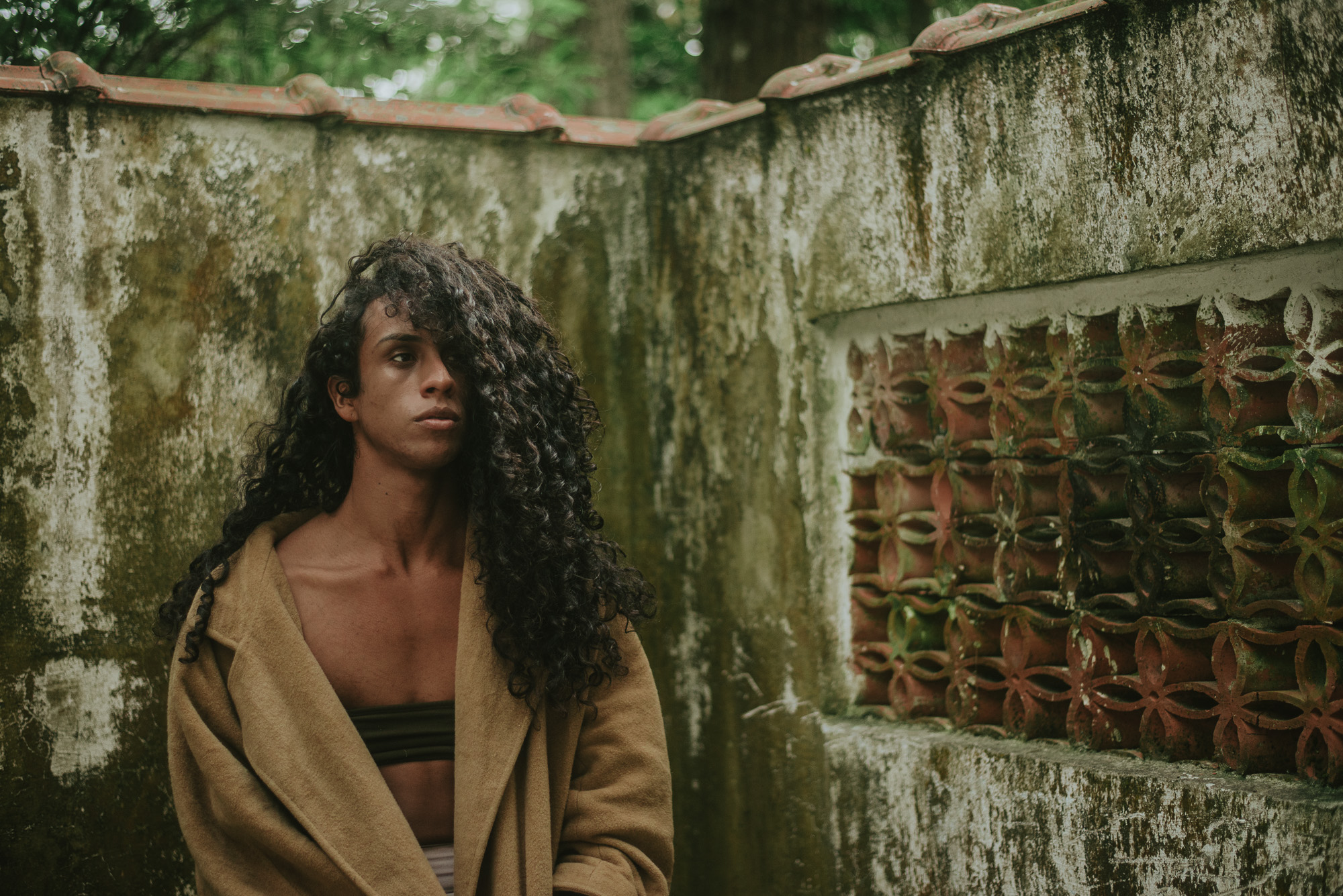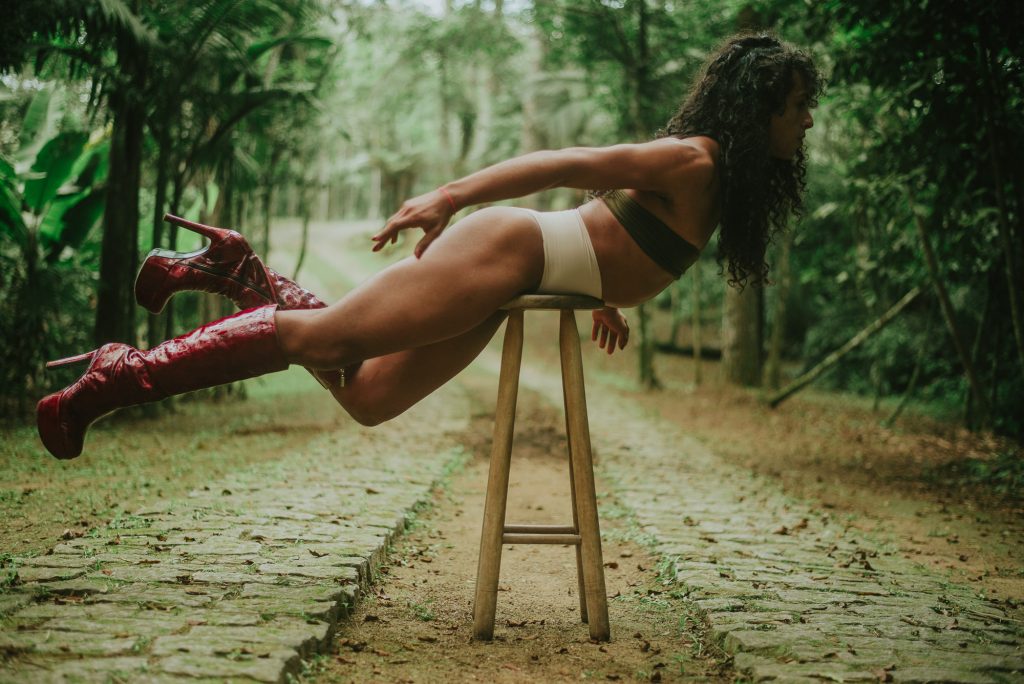Linn da Quebrada and her combo were in the middle of performing a live set for Brazil’s Estúdio Showlivre earlier this year when the vocalist turned to the camera and breathed a few words into the microphone. “É história.”
She neatly cued the percussion for the intro to “A Lenda,” a spare bossa nova track. Over the beat, Linn recited a story of a girl who would do anything to entertain, but instead of applause, is greeted with ridicule and summarily rejected by her church and family. “She was disassociated,” intoned her femme backup singer Jup do Bairro, whose reverberating responses to Linn’s lyrics were eventually traded in for an outro of scornful laughter, echoing from Linn’s past. The frontwoman had a thick, Little Mermaid-red braid and a flowy lavender look echoed by Jup, the percussionist, and DJ BadSista. Radical honesty, first-person queer art, and fashion on commercial television; the performance was what history should look like.
Months later, and with the release of her debut LP Pajubá, Linn has ditched the pastels for earth tones and can be spotted holding a bullhorn or a dildo on stage, still looking cut and gorgeous. The album marks a vast expansion from her previous work in baile funk, the dominant street sound in Brazil. “Today, I feel like my music has extrapolated from funk, and dialogues with vogue, global ghetto, and electronic music,” says Linn in an interview with Remezcla.

By no coincidence, these are all genres of music pioneered by queer people, historic sources of strength that Linn updates to reflect her 2017 reality. Dark club beats provide her confrontational lyrics with an auditory web, masterminded by Pajubá’s musical director BadSista (aka Rafaela Andrade), and producers Nelson D, Carlos NuneZ, Vincenzo, and Diego Sants. The album opens with the pared-down vogue of “(Muito +) Talento,” in which Linn serves notice that she will not be easily minimized to a sex object, and travels down a highly personal road, past aggressive sexual proposition (“Pare Querida”), ending up in the tender origin story of “A Lenda.”
“I make music to create strength to sustain this femininity.”
The strength of the work is palpable. As with the Estúdio Showlivre appearance, Linn’s live shows range from upbeat baile funk to minimal, voice-arching moments that feel like performance art. Her success — as well as that of the other queer and trans artists with which she collaborates and associates — provides singularly defiant voices for change in a country whose relatively large trans population continues to be plagued by acts of violence.
Pajubá is quite explicitly for Linn’s LGBT community. The title is a reference to the secret language created by Brazilian queers and trans folks, heavily influenced by West African Yoruba. “I named the album Pajubá because for me, [the album] is the construction of language,” says Linn. She identifies as a trans woman, or in her own words, “uma bixa travesty” — “faggot travesti,” a reclamation of two words wielded as slurs.

Since her performance debut at Periferia Trans, a festival that takes place on the outskirts of São Paulo that she remembers as “the right stage, the opportune moment, and for the people who needed to hear me,” Linn’s music has always been sharp and unapologetic. Many songs deal with trans defiance, the art of being fierce, the radical nature of self-acceptance. Linn’s “Bixa Travesty,” like many of Pajubá‘s tracks, is addressed to a hypocritical macho whose sexual services are no longer needed. With a bleeding heart in hand, the song’s protagonist informs him, “You can leave with your dick between your legs/Your empire has ended.” She concludes with a mocking tribute to aggressive masculinity and a final directive: “Whip your dick out/Go!”
Linn grew up in a highly religious family in the São Paulo town of Votuporanga, raised largely by her aunt while her mother worked in a neighboring town. As a teenager, Linn got a job in a beauty salon, where she finally felt free enough to experiment and find her true identity and style. She was thrust into the complications of living in a feminine form and the ways that it left her vulnerable to the cruelties of others.
In the face of these injustices, Linn’s art is her armor. “I make music to create strength to sustain this femininity,” she says. “I make music to reinvent in my own imagination the possibilities of potency that exist in feminized bodies.”
She knows that she is far from the only person in Brazil who needs this strength. Like the rest of the world, the country struggles with violence against its queer and trans populations. Happily, there is a rising generation of artists from both those communities that are slowly and surely making waves in Brazilian culture. Stylist Brecho Replay has defined a mystic, colorful fashion aesthetic (he styled the lavender looks for Linn’s team on Estúdio Showlivre.) Singers Gloria Groove, Jup do Bairro, and Mulher Pepita brandish their personal style like swords, more than happy to chop down the transphobes and homophobes that would impede their trajectory.
Their visions blended to create Pajubá. “I admire them all, and we are here together with the same intention, which is to remove the macho from the central focus,” says Linn.
São Paulo DJ Eduardo Pininga met Linn about a year ago, at her second appearance at the Periferia Trans Festival. “I had seen a video of her freestyling in the streets and just fell in love,” he remembers. He introduced himself after the show, and within a week they were meeting every day to talk about new tracks or live shows.

“Except for the straight male percussionist, we are all a bunch of faggots, femmes, lesbians, travestis, blacks, who come from poor regions or the periphery,” says Pininga. “It’s really amazing to see how much we can accomplish with so little. It kinda gives us more liberty to not fulfill any commercial standards and say things that were never said before.”
“They never had any real space to talk about gender or LGBTQ life.”
He says that queer and trans characters, like TV personalities Vera Verão, Cinderela, Elke Maravilha, Roberta Close, and Ney Matogrosso, have long been present in Brazilian culture, but that doesn’t mean that as a kid he had any role models for how to live his life outside of hetero norms. “They never had any real space to talk about gender or LGBTQ life,” he remembers. “We just knew they were different, but we had to learn about it on the streets because we couldn’t talk about [queerness] at home.”
That attempt to hush their voices hasn’t worked on Linn’s and his cohort.
Linn announced Pajubá’s arrival on social media with a sly “Was it a trans Lemonade you wanted, girls?” The Bey reference is a bit tongue-in-cheek where the visuals are concerned — Pajubá’s aesthetic is sparse and vegetal, an homage to the power Linn and her creative team felt emanating from the jungle setting in which they worked on the LP. But visuals aside, righteous anger, and an eventual bid for the healing that comes through disclosure, characterize both Lemonade and Pajubá.
Photographer Nu Abe shot the videos with Linn and Jup (who accompanies Linn everywhere, on stage and in fan art that makes them look like Flashdance super heroines) bare-faced in the largely unchoreographed, open-air clips. Each of Pajubá‘s videos is comprised of one or two movements, slowed down as to encompass the length of a song. The videos, sped up to normal velocity, might make a single commercial music video. As they stand, they are contemporary art.
The conviction that what she has to say must be heard on the level of the great pop divas is clearly a motivator for Linn da Quebrada. When talking about dream collaborations, she name drops Rihanna. “I like her and I really identify with her work,” says Linn. Everyone wants to work with Rihanna, but for Linn this seems less like aspiration and more like self-awareness, a recognition of like-minded, powerful unbotheredness in another artist. If you squinted at an ultra minimalist redux of the solo shots in the “Where Have You Been” video slowed down 100 times, the result might well be Pajubá, the visual album.
The strength-in-numbers approach to Pajubá that resulted in such a seminal studio cast can be seen even in the album’s economics. Linn opted to crowdfund the LP’s production. “This record is not just mine,” she says. “It’s everyone’s who finds themselves in these subjects that we have always wanted to discuss, who finds in [the album] a space of representation.” Pajubá has just as much to say about her generation as her as a solo artist. “It’s a plural record, made of many voices,” she says. “I’m only one of them.”
Linn da Quebrada’s Pajubá is out now.







